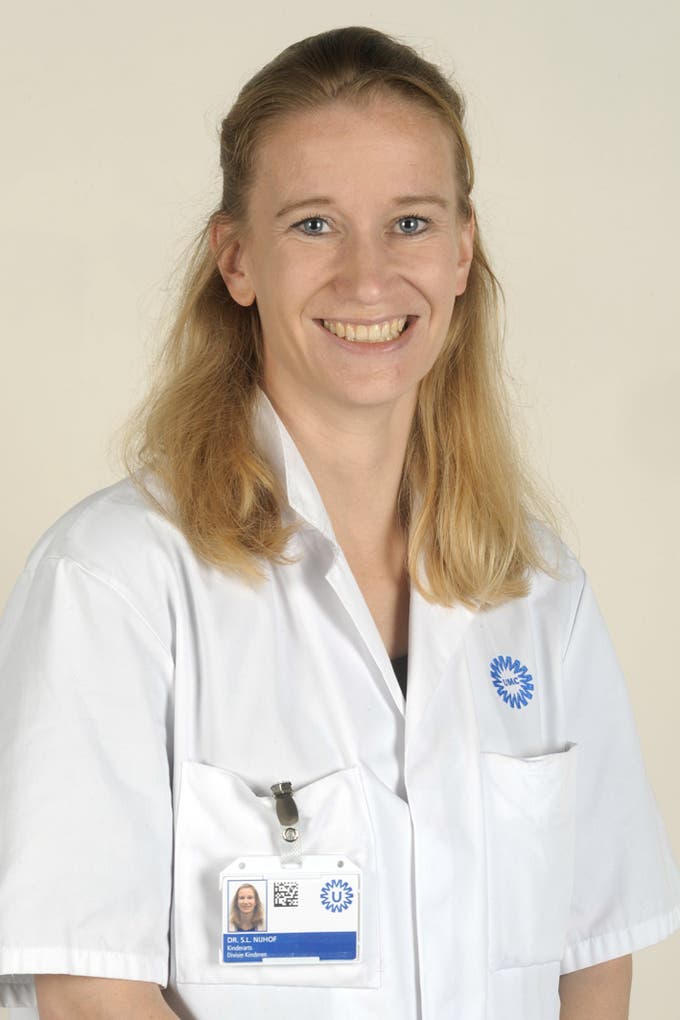Nijhof, S.L.
Nijhof, S.L.

Sociale Pediatrie patientenzorg
BIG nr. 29066211601
Wetenschappelijk onderzoek
Kijk voor alle wetenschappelijke onderzoeken, artikelen en eventuele nevenactiviteiten van Nijhof, S.L. op de website wetenschappelijk onderzoek van het UMC Utrecht (in het Engels).
Aandachtsgebiedenuitklapper, klik om te openen
- Kinderen met onverklaarde lichamelijke klachten, met of zonder een chronische ziekte
- In ontwikkeling en veiligheid bedreigde kinderen, in het bijzonder kindermishandeling
- Levensloopgeneeskunde
Biografie
Biografie
- 2000-2006: Geneeskunde studie
- 2006-2015: Opleiding Kindergeneeskunde i.c.m. promotietraject UMC Utrecht
- Promotie 2013: In 2013 promoveerde ik op het Chronisch Vermoeidheidssyndroom. In dit traject heb ik samen met Prof vd Putte en het Nederlands Kenniscentrum Chronische Vermoeidheid FitNet ontwikkeld. Dat is een behandeling voor jongeren met Chronisch Vermoeidheidssyndroom die helemaal via internet verloopt. De effectiviteit hebben we onderzocht in een RCT die in 2012 gepubliceerd werd in de Lancet. De behandeling is inmiddels geïmplementeerd in zorg.
- 2016-2020: Fellowship sociale pediatrie i.c.m. algemene pediatrie Wilhelmina Kinderziekenhuis UMC Utrecht
- 2019: Benoeming tot associate professor kindergeneeskunde
- Per 2021: kinderarts sociale pediatrie, Wilhelmina Kinderziekenhuis UMC Utrecht
Wetenschappelijk onderzoekuitklapper, klik om te openen
1. Effectiveness of FitNetplus (together with the Amsterdam UMC): web-based treatment of severe fatigue among adolescent patients with an immune dysregulation disorder: a single-case experimental design with multiple measurements.
2. PROactive study: PROactive is a longitudinal cohort study started in 2017 in which data is collected using a comprehensive range of questionnaires among paediatric patients (2-18 years old) with a chronic/life-threatening disease (e.g. cystic fibrosis, auto-immune diseases, childhood cancer) and their parents. The aim of this research project is to study the prevalence of chronic fatigue and pain, and further explore the relation with societal participation, psychosocial and behavioural factors – from the child’s as well as parent’s perspective.
3. PROfeel study: development and validation of a digital ‘on-the-spot’ monitoring of fatigue, pain and social participation in chronically ill children.
4. FITNET-NHS study (together with the University of Bristol, UK): Investigating the effectiveness and cost-effectiveness of using FITNET-NHS (Fatigue In Teenagers on the interNET in the NHS) compared to Activity Management to treat paediatric Chronic Fatigue Syndrome (CFS)/Myalgic Encephalomyelitis (ME) in the United Kingdom, a randomized controlled trial.
5. Healthy Play, Better Coping: is one of the interdisciplinary research projects (HUB) of Dynamics of Youth Strategic Theme of the UU. Within this research project, the impact of chronic illness on developmental outcomes of children is further explored. Specifically, the relationship of (impaired) play behaviour with physical, social, cognitive and emotional maturation will be further assessed, in order to provide a solid foundation of knowledge and that may eventually aid in designing personalized interventions for chronically ill children.
6. The eHealthJunior consortium: ‘Feeling good, despite illness’ with a focus on accessible eHealth supporting the well-being of chronically ill children. Mission: We aim at making scientific eHealth tools that allow personalized and trans-diagnostic prevention widely available to chronically ill children, through safe platforms. Please see: https://ehealthjunior.wordpress.com/.
7. Discourse language analysis of recovered vs non-recovered CFS patients in the context of the treatment programme FitNet (together with Utrecht institute of linguistics and Leiden University)
8. Dyadic coping concepts: The power of the unspoken: Paradoxical effects of parent-and child-oriented self-regulation on personal wellbeing (together with faculty of social sciences).
Datum promotie: 6 december 2013
Titel proefschrift: 'Chronic Fatigue Syndrome in Adolescents- Treatment, clinical features and epidemiology’

